It started out as an idea between two aspiring screenwriters fresh out of college. Then they went through an extreme crash course in how things are done in Hollywood.
That’s been the story so far in this two-part oral history of 1993’s Last Action Hero. Here’s the link to the first part. Appropriately enough, the next part of the story sees even more screenwriters fired and re-written, a rushed production which was at least a month too short, a disastrous test screening resulting in shredded comment cards, a failed partnership with NASA to literally advertise the movie in space, an ill-fated decision to stick with opening the weekend after Jurassic Park and a reflection on the film’s lasting legacy, i.e., the standard, “It’s not that bad, really.”
THE DIRECTOR – “IF WE SHOOT ARNOLD SITTING ON THE TOILET WE’LL MAKE $150 MILLION”
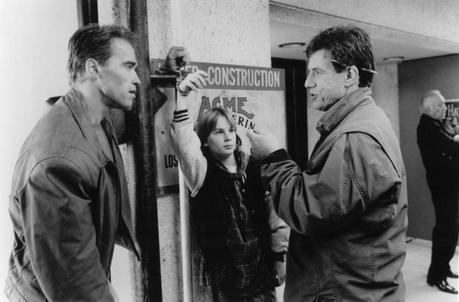
Shane Black, co-screenwriter: While David [Arnott] and I were getting excited about the story, the studio was getting clinical about the marketing. They were assessing if things worked for women, or worked for old people, or worked for cats and dogs. Pretty soon I realized we were getting all excited trying to do something that may be breaking some ground or is a little out there. No one wants to be “out there.” They want to say, “There’s a formula we have.”
John McTiernan, director: Shane [Black] had done enough service in the salt mines of action movies to ridicule them in an acid way. The script had so much venom that I loved it. But I shied away from Last Action Hero at first because there was just too much noise about it. I sort of why away from things if there’s a lot of hype involved, just because it is very hard to tell what’s real from what’s nonsense in a situation like that.
Zak Penn, co-writer of the first two drafts of the script: We always thought it would be someone like Robert Zemeckis or John Landis directing. Someone with a history of pulling genres apart. I like Shane and I like John McTiernan — I wouldn’t have watched all their movies so many times if I didn’t. But I do think it’s easier for someone from the outside to mock the conventions of action movies than it is for the people who created them in the first place.
Black: McTiernan had made a lot of hits [like Die Hard and The Hunt for Red October], so the studio said, “Let him do what he wants.” And we watched as John rewrote the whole thing. I have a lot of fondness for John. He’s an interesting guy with a lot to say. He just wasn’t keen on the things we’d written.
Arnold worked with Columbia to convince William Goldman, fresh off of Misery, to rewrite the script over four weeks for $1 million. He changed the satantic projectionist into a kindly old man, promoted the secondary villain, and made the boy a pre-teen instead of full-on teenager. Goldman’s work was uncredited and he was eventually re-written by uncredited writers as well.
McTiernan: Goldman gave Arnold a character to play, and he excised 150 toilet jokes.
Black: Back in those days, that kind of thing was an insurance policy for keeping your job at an executive level. A script would be questionable and the trembling executive would give it to a famous writer with a million bucks, so he could say, “Yeah, it’s fortified now. We’ve given it vitamins. Wait, wait, wait… It needs the woman’s touch. Give it to Carrie Fisher!” It just made people breathe easier, throwing money at this enormous behemoth. Even if the movie sucked, now they could say, “It’s not our fault.”
Adam Leff, co-writer of the first two drafts of the script: I think the reason Last Action Hero turned out the way it did is because everyone was running scared making sure that Arnold doesn’t walk from the picture. “Give him what he wants. It doesn’t matter.” “He’s the biggest box office star in the world, if we shoot him sitting on the toilet, we’ll make $150 million,” that was the thinking.
David Arnott, co-screenwriter: A perfect example of how, in rewriting a script, certain things stay that don’t make sense anymore is how in our draft you both understand what became of Danny’s father and see the villain character set Seventh Seal’s “Death” loose in New York City. When it’s set up properly, you would understand a moment where Death comes into the theater, Danny pulls the gun, and he says, “Forget it, I’ve had it up to here with you, Mister, who stays and who goes. Well, I’m telling you this one stays, “ meaning, “You took my dad, but you’re not going to take my surrogate dad.” That could have been a real moment. Death is still in the finished movie as is the speech, but it makes no sense. It’s just there.
Penn: One thing I would’ve like to have seen is that they kept it with a seventeen-year-old, who’s more sophisticated and has a wish fulfillment on a more subtle level than a screeching twelve-year-old saying, “I’m in a movie! I’m in a movie!”
Black: We wrote Danny as a little older. The kid was in high school. And the studio chose to play the kid as a darling. I thought he should be kind of a wise-ass, like Anthony Michael Hall from Sixteen Candles, but it was changed wrongly by the process, by the studio, by everybody to be cute. I hated Home Alone. I don’t like cute. I like real kids. You know what real kids are like. They’re not precious, they’re not darling, they’re assholes.
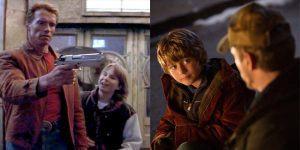
Black oddly ended up going with a cute kid sidekick in Iron Man 3
George Huang, rewrite page coordinator: Last Action Hero was a perfect example of moviemaking by committee. It became everybody’s version of what they thought the movie was about. In the process it became nobody’s movie. Everyone was writing on it. Hell, I even think I threw a few pages in.
Black: I don’t hold anything against the people who tried so hard to make that movie work. John McTiernan tried his best, we tried, Goldman tried. The studio was afraid. I guess that’s the only thing I have problems with-it’s fear. I don’t like people who start changing things out of fear and flinching.
THE SHOOT – “THE DEEPER IN WE GOT, JOHN LOOKED MORE TIRED, MORE HAGGARD”
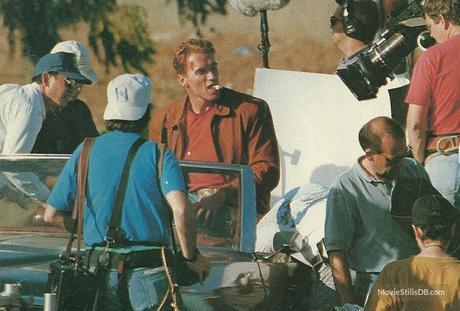
Austin O’Brien, Danny Madigan: During the first week on set we kept screen-testing cars — Arnold and I would drive around in different vehicles, trying to find an iconic car for Slater. That was such a strange process. I also remember Slater’s boots being a really big deal.
Robert Patrick, cameo as the T-1000 from T2: I was doing ADR for an indie film when I got a call from Arnold. He went, ‘Robert, I want you to do the T-1000 cameo you did in Wayne’s World for my movie.’ I think we even talked money, for Christ’s sake. It was just, ‘You have to do it for me! You have to do it for me!’”
O’Brien: Every day there was something amazing happening: a car flying over a truck or a huge gunfight. And we had a big enough budget that if we blew something up and it didn’t look great, we’d do it again!
Charles Dance, the bad guy Mr. Benedict: [Arnold] creates an extraordinary atmosphere on set, because everybody in the film industry is rampant with insecurity and paranoia. Everybody’s nauseatingly nice to each other for fear of the next job. But the more I worked, the more I realized the good atmosphere actually came from Arnold.
Arnold Schwarzenegger: I was also the movie’s executive producer, which meant that I had to approve every facet of the project: developing the script, picking the director and the cast, lining up the studio for financing, distribution, and marketing, setting the budget, getting a PR firm on board, planning the foreign release, and on and on. The added responsibility was a pleasure. I could be involved in everything, from dreaming up promotional stunts to approving the prototypes for Jack Slater toys.
McTiernan: The head of the studio couldn’t decide whether this was an action movie or a kids’ movie. I was getting pushed in a lot of directions. When I was sent the script, the thing I liked was that it was wildly irreverent. But that was all getting watered down. And we were just trying to get the damn thing finished.
Penn: After a couple of weeks [of playing a bit part in the film as a police officer in the precinct scenes], another actor turned to me and said, “Zak, I hate to tell you this, but if you look at where the camera is, you’re never in frame. McTiernan has basically blocked you out of the movie.’” You might be able to see my shadow if you look closely. I did laugh about it later, but it was so silly — why didn’t they just tell me to go home?
McTiernan: The initial intention came from the guys, from Zak and Adam, and carried right through with David and Shane’s work, and Bill Goldman’s, that this was a fairytale. That was followed with original studio decisions like what is the rating of this movie. The studio designed it as PG-13 right from the beginning, shooting for a younger audience. Therefore, the picture couldn’t concentrate on violence.
Schwarzenegger: [John McTiernan and I] were having a drink after shooting until three in the morning one night in New York, and he said, “What we’re really making here is E.T.” When I heard that, I had a sinking feeling that maybe the whole PG-13 thing was a mistake. Even though we had a kid costar in the movie, people might not buy me doing a family-friendly action film.
O’Brien: I do remember that the deeper in we got, John looked more tired, more haggard. He was great with me — when we got something right he’d turn into a little kid and start jumping around — but there was one day when I got a sense of how under the gun he was. We’d built a New York skyline inside the studio and I was hanging from a gargoyle, wearing a harness. It was so tight that I literally couldn’t breathe, but I was too nervous to say anything and I passed out for a few seconds. People were cutting my clothes off and it got kind of scary. But I do remember McTiernan coming up afterwards and saying, “In situations like these, I don’t care what’s happening, you tell me and we’ll fix it. Don’t be afraid. You haven’t done anything wrong, but we cannot afford to stop shooting.”
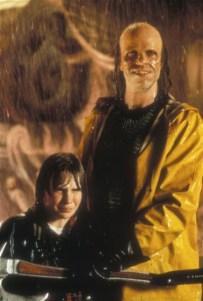
Arnott: We definitely suffered from having to make a release date. Certainly postmortem, but even during, they all said, “What are we doing? This is insane.” But they had already agreed to do it. The train had left the station at that point, so all you could do was get on it.
Peter Guber, Head of Columbia Pictures: Once you have a release date for a big picture, the momentum is like a tsunami. It takes a real act of derring-do to step in front of it and say stop. It’s got so much momentum-the toys are being sold, the videos are being sold, the marketing machine, everything starts to work. It’s so hard to hold your hand up and say, “Whoa, whoa, whoa, the script ain’t right yet. Or the actor passed. This one isn’t as good,” or, “Wait a minute there’s a problem with this director.” It’s very, very, very hard to stop it. Once it gets going, you’re throwing yourself in front of a moving train and it’ll run you over. They’ll consume you. They become a self-fulfilling prophecy. What’s up on the screen is not the toys. It’s not the soundtrack. It’s not the video sales. It’s the script and its interpretation by the filmmaker. And if that’s six degrees off at launch then a year and half down the line when the film’s all put together, it’s five thousand miles off track. You have to make sure it’s on the page before it’s on the stage.
Moore: You had so many 800-pound gorillas as part of that movie that nobody actually took responsibility to look at the dailies and say, “You know what? This is all over the place.” From the original script to what it became, there was no one single vision. Most movies that are good are because of a guy who says, “I know the movie I want to make” and everybody comes on his train to make a great movie. Because you had Shane Black writing, Arnold Schwarzenegger starring, and John McTiernan directing, and they were all trying to be so polite and courteous and respectful of each other’s opinions, nobody stepped up and said, “Listen, this movie to me is this, this is what we should do.”
Shane Black and David Arnott were asked to come back during the last month and a half of filming to work as on-set script doctors as the shoot ran long and the budget spiraled out of control.
Black: I declined. We’d been fired and now they wanted us to fix up the explosions and helicopter scenes? I considered it an insult to my professional pride.
THE EDIT – “THE EDITORS ARE DROPPING LIKE FLIES” / “HIRE MORE FLIES”
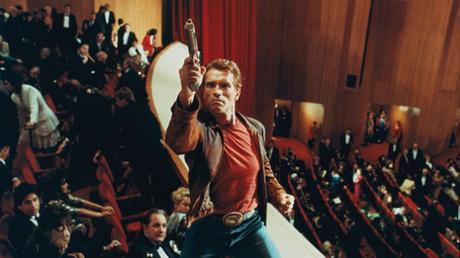
McTiernan: [Including reshoots] it was something like three weeks between the end of filming and the movie being in theaters. Do you know the old joke? The editing department says to Cecil B. DeMille, ‘The editors are dropping like flies.’ And DeMille says, ‘Hire more flies!’ We were living that. There are enormous sequences in the film that are literally how it came out of my camera. We cut the heads and tails off, and that’s the sequence; it wasn’t edited at all.
May 1, 1993 – A surprise test screening was held 45 minutes south of Los Angeles.
McTiernan: I would say the movie was shown in the roughest form I’ve ever seen a movie screened. I had great trepidation showing the movie in that state.
Schwarzenegger: The movie was still so unfinished that it ran for two hours and twenty minutes [ten minutes longer than the finished film’s running time], and you couldn’t make out most of the dialogue. By the end, the audience was bored. After that, the schedule was so tight that we ran out of time for more tests. Instead, we were forced to fly blind without the feedback you need to fine-tune a movie.
Black: It was a mess. There was a movie in there, struggling to emerge, which would have pleased me. But what they’d made was a jarring, random collection of scenes. The casting of the little boy was one of the absolute misfires of Western culture. Also, they rewrote every line of ours, and I don’t like the dialogue they wrote.
Penn: There were suddenly all these little in-jokes that worked against the story. It turned into, ‘Let’s go to a videostore and do a joke about Stallone taking your parts.’ I don’t know about you, but I’ve never seen a Seagal movie where they go to a videostore.
Moore: It had shot way off to the left of what was originally intended. If there’d been more time, there’s a chance someone might have stood up and said, ‘What the fuck are you doing with an animated cat?’ Something which, from the outside looking in, looks like a decision of somebody using drugs.
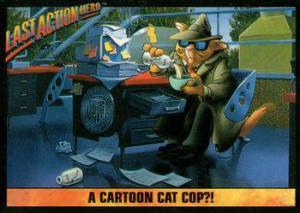
Mark Canton: I didn’t want the director, who had literally been working eighteen hour days, and our star, to come up with fourteen more ideas that would take three weeks to shoot. We didn’t have three weeks.
Eventually, details of the test screening leaked to the press, though filled with plenty of inaccuracies. However, on the night of the actual screening McTiernan and Schwarzenegger convened for an emergency meeting with the studio, and asked to push back the release date. Canton refused to budge.
McTiernan: The studio folks assured us that the movie was more likely to make money this way, that the amount of money that the studio would see would decrease by about $10 million per week for each week of the summer that you cut off. I’m not about to argue about things like that.
THE MARKETING – “IT WAS ME WHO FUCKED IT UP”
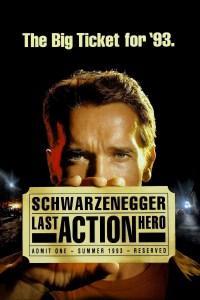
McTiernan: From the moment I saw the “Big Ticket of ‘93” in the first test-ad copy for the particular ad campaign, I anticipated that it would provoke a negative reaction, that it was just arrogant. Several of us said that to the studio.
Sid Ganis, marketing chief: There’s no genre for this movie. It only looks like an action movie. It’s about an action movie star. I think it’s more – what it is, it’s, it’s, uh, fantasy. But when you have Arnold, you have Arnold plus his total understanding of his public. And he knows how to market himself within that awareness.
Schwarzenegger: When the toy people showed up with their prototypes of a Jack Slater doll, I vetoed the combat weapons they proposed. I said, “This is the nineties, not the eighties.” Instead of wielding a flamethrower, the toy Jack Slater threw a punch and said, “Big mistake!” – which was his tagline against the bad guys. On the toy package, it said, “Play it smart. Never play with real guns.”
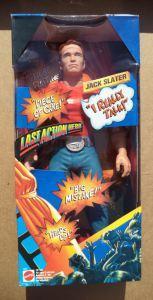
Schwarzenegger: Besides the action toys, we licensed seven kinds of video games, a $20 million promotion with Burger King, a $36 million “ride film” to go into amusement parks, and – this was my favorite – NASA picked us to be the first-ever paid advertisement in outer space. We painted “Last Action Hero” and “Arnold Schwarzenegger” on the sides of the rocket and then held a national sweepstakes whose winners would get to push the launch button. We put up a four-story-tall inflatable statue of Jack Slater on a raft just off the beach at Cannes during the film festival in May, and I set a personal record there by giving forty TV interviews and fifty-four print interviews in a single twenty-four-hour period.
The NASA rocket was scheduled to launch in conjunction with the film’s June release, but by May it was postponed and eventually canceled.
McTiernan: I didn’t have time to get intimately involved in all the press disasters, but the advertising campaign was terrible. It did seem that if they hadn’t overhyped the movie, it would have been a lot easier to sell it. Because it’s actually sweet and kind of small in its heart. It isn’t Cleopatra. It’s the anti-Cleopatra. And if they had come on a little more quietly, it probably would have worked out better for them.
Penn: I never expected that we’d get all the negative attention.
THE RELEASE – “IT WAS LIKE, ‘DON’T TALK ABOUT THE MOVIE, BUT THESE ARE SOME REALLY GOOD FUCKING CANAPES'”
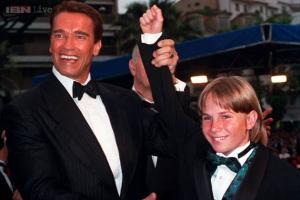
Moore: Going to the premiere was a big deal. Everybody was nice to me and said things, and it was this huge ordeal. But you know, the movie wasn’t good. It’s not a good feeling to stand around a giant premiere when they spend $200,000 on a 40-ft blow-up doll of Arnold and feel, “Wow, it’s just not that good,” you know?” And it’s sad, everybody knew it. Every single person knew. We were all just sitting there, walking around, having free sodas, and just looking at each other. Everybody smiling and shaking each other’s hands.
Black: Everyone ate the food and drank the drink and nobody said anything to each other about what they’d sat through. It was like, “Don’t talk about the movie, but these are some really good fucking canapés.”
Penn: It was not a pleasant experience. People kept saying, ‘Did you do all those fart jokes?’ ‘No, no, that wasn’t me.’ ‘Why did you have a kid thrown off a roof in the opening sequence? It made my kid cry.’ ‘I didn’t write that!’
June 18-20 1993 – Last Action Hero opened to $15 million, $5 million below expectations. For the entire theatrical run, the studio’s break even point was a domestic total of $80 million; Last Action Hero only made it to $50m, although it reached $121 million worldwide, a comparable gross to that year’s Stallone action flick Demoltion Man.
Penn: It was insane. I rang [the Columbia boss] up and said, “I want to see Jurassic Park more than Last Action Hero, and Last Action Hero was my idea!”
McTiernan: [Releasing it so close to Jurassic Park was] sheer stupidity. I saw Jurassic Park that summer: it’s a fabulous movie. But the studio tried to set us against each other, which was an idiotic thing to do. Because we weren’t the greatest action movie of all time. We were never supposed to be.
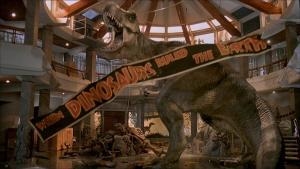
McTiernan: We really got stomped by a dinosaur. In other circumstances, people might have, if not applauded, at least noticed the attempt to make an honest movie.
Schwarzenegger: A lot of people liked Last Action Hero, as it turned out. But in the movie business, that’s not enough. You can’t have people just like your movie, you need them to be passionate. Word of mouth is what makes movies big because while you can put in $25 million or $30 million to promote the movie on the first weekend, you can’t afford to keep doing that every week.
Penn: Last Action Hero – and I think Waterworld is an even more annoying example – with both of those movies the media attacks them because they sunk all this money. Imagine if AT&T was building a new phone line, and it blew up, for example. And so they had to spend a hundred million dollars on it. You wouldn’t see mocking articles saying, “Can you believe AT&T lost all this money?” Waterworld, their set sunk! That’s not their fault.
McTiernan: [Arnold] made himself very vulnerable, and he was very proud of it…and to be rejected so soundly when he had allowed himself to be so naked – it sort of, like, broke his heart, but I suppose that’s too flowery a phase. It broke him up terribly.
Schwarzenegger: It’s embarrassing to fail at the box office and have your movie not open well. It’s embarrassing to have terrible stories written about you. It’s embarrassing to have people start calling this your year to fail. As always, I had the two voices battling inside my head. The one was saying, “Goddammit, oh my God, this is terrible.” And the other was saying, “Now let’s see what you are made of, Arnold. Let’s see how ballsy you are. How strong are your nerves? How thick is your skin? Let’s see if you can drive around in your convertible with the top down and smile at people, knowing that they know that you just came out with a fucking stinker. Let’s see if you can do that.”
McTiernan: I went home and didn’t want to talk to anybody for a year and a half. Stayed in Wyoming and did the hay. I had to lick my wounds.
Schwarzenegger: When you feel embarrassed like I did, you tend to assume that the world is focused on your failure. I’d go into a restaurant somebody would say, “Oh, hey, how are you doing? I see the new movie’s out, that’s great!” And I’d feel like, “That’s great? You motherfucker. Didn’t you read the LA Times?”
Black: After the movie came out, Arnold, John and I went for a beer. John couldn’t get his head around why it had gone so badly, because he knew there were troubles with the film but he was still proud of it. But by the end of the conversation we were getting really excited about the concept of the new Die Hard he was going to do. It was good to see him smile again.
McTiernan: It had been sold so aggressively that it had to appear to be too many things to too many people. That’s not a very good creative environment, it’s damaging. Too much of a circus is damaging.
Schwarzenegger: In hindsight, if the kids see “PG-13” they say, “Well, I’ve heard you talk about that, Arnold, you want to tone down the violence. I’m not interested in that-I want to have limbs come off, I want to have heads come off like in Total Recall. I want to see bodies flying around.”
THE LEGACY – “A LOT OF PEOPLE DO LIKE IT BECAUSE THEY FEEL, LIKE, AT LEAST IT’S AN UNUSUAL MOVIE”
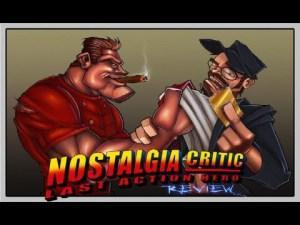
From Playmaker’s recent defense of Last Action Hero
Black: In a way, it was the last of the smug big movies. Maybe Michael Bay’s are still this way, but there’s a smugness to Last Action Hero — a celebration of spending money in itself.
Moore: It was a historical moment, where so many people saw this craziness unfold that it created an embarrassment and a ripple effect in the business. Somebody needed to step in and say, ‘Look, we’ve got some of the most talented people on Earth and a shit-load of resources — what is the actual movie we’re making?’ Instead, everybody avoided the hard conversations, so the movie attacked and ate itself. It’s the ultimate cautionary tale.
Black: On the first day’s meeting, I brought up a meeting and one of the executives laughed and said, “Gee, but that’s not a scene in a movie which makes $200 million.” I realized we were sunk. That’s what the studio’s goal was from day one. You can’t set out to make a picture that makes $200 million. That’s like a guy who steps up to the plate in baseball and takes on of those home run swings and whiffs.
Schwarzenegger: From the moment Last Action Hero hit the theaters, it got stomped. But in fact, Last Action Hero made money and was a failure only in comparison to what had been anticipated. If I hadn’t been such a big star, no one would have noticed. It was too bad, because I loved the idea of the movie.
Penn: Could you come up with a better crash course in Hollywood? From how we got an agent, and that whole thing, which was a very extreme Hollywood agent story, to the sale, which was an insane roller coaster, which was crazy. To the movie itself, which has gone down in history as an all-time case study.
Black: It should have been a movie about wonder and sadness. It was instead a movie about crowd-pleasing moments where little boys are just screaming, “Yeahhh,” like we were supposed to cheer. Satisfying an audience and making them cheer are two different things. I think, that in Last Action Hero they made this very obvious movie that tried to please everyone and ended up pleasing essentially no one.
Penn: A friend of my mom’s is a film critic in New York who actually liked it. I disagree; I don’t really like [Last Action Hero]. I think it’s pretty hard to sit through. But a lot of people do like it because they feel, like, at least it’s an unusual movie. It’s, like, a weird movie. Particularly with the way they did it, it was really weird.
Sources: Empire, Hit & Run by Nancy Griffith & Kim Masters, Blockbuster by Tom Shone, The Big Deal by Thom Taylor, Arnold Schwarzenegger’s autobiography Total Recall.

